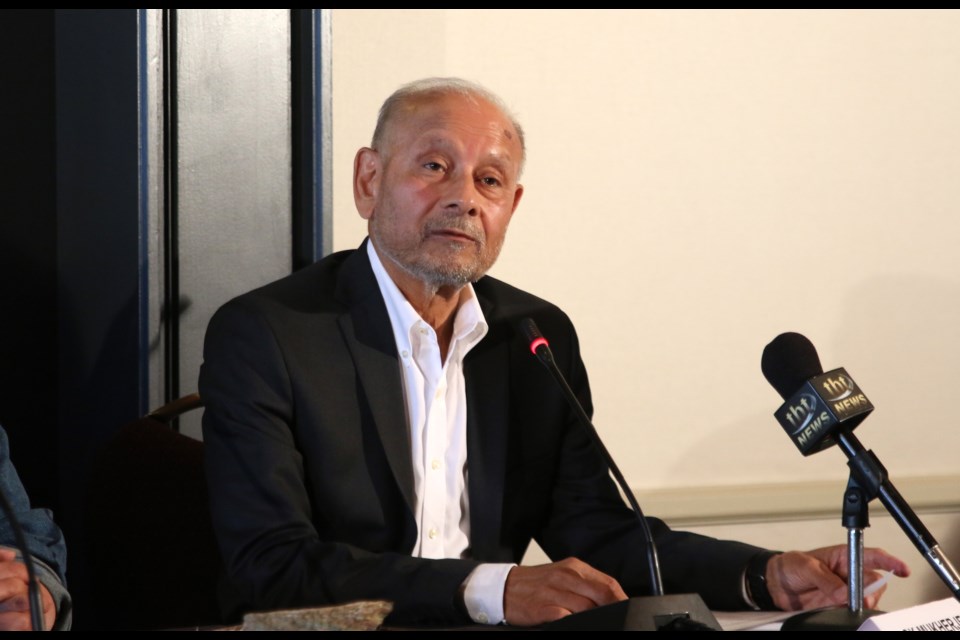THUNDER BAY - After consulting with more than 60 individuals and organizations throughout the week, the expert panel appointed to review policing in Thunder Bay will hand down interim recommendations in the coming weeks with the full report expected later in the fall.
“We are considering the idea of moving forward with recommendations in the interim before finishing our final report to keep things moving forward,” said panel chair Alok Mukherjee. “We hope to have those interim recommendations to the board and administrator in the coming weeks.”
The panel held a media conference on Thursday to discuss its plans moving forward and some of the issues and concerns it heard during consultations while in the city.
The nine-member panel was appointed by the Thunder Bay Police Services Board earlier this year. The majority of board members have since resigned and an administrator has been appointed by the Ontario Civilian Police Commission to oversee the board.
Mukherjee said it has been the panel’s job to apply a critical lens to any progress being made on implementing past recommendations relating to policing in Thunder Bay from previous reports including the Ontario Civilian Police Commission and the Office of the Independent Police Review Director.
“Our job is to review the progress that has been made, identify gaps and barriers, and propose tangible and practical additional steps to assist the new board this fall and the new chief in their efforts to rebuild trust with the community and transform the Thunder Bay Police Service,” he said.
Throughout the week, the panel met with more than 60 individuals and organizations, including Indigenous people and leaders, members of the Thunder Bay Police Service, and it also held two public consultation sessions.
According to Mukherjee, one issue that came up repeatedly throughout the week is the model of policing and references to the city of Thunder Bay being a regional hub.
“The question has arisen of whether it is adequate to have standalone city municipal police service to provide services that are actually regional in nature,” he said. “The question of building collaboration and building partnership so there is a regional focus in terms of serving and protecting people has come up again and again, so that is something we need to think about.”
Mukherjee added that it does not necessarily mean the Ontario Provincial Police taking over governance of the Thunder Bay Police Service. He said governance still needs to be civilian and it needs to be a community-to-community and nation-to-nation process.
“Trust needs to be built absolutely,” he said. “But it needs to be built through concrete, on the ground, day-to-day working together. If we talk about a different model it is a model that uses optimally the resources that are already there.”
During a public consultation held on Wednesday, one participant said the panel cannot focus solely through the lens of the individual member’s backgrounds because a solution will not be found that works in Thunder Bay.
Panel member Paul Cook, former chief of the North Bay Police Service, said after the consultations held throughout the week, the panel has a much better understanding of the issues and challenges facing policing in Thunder Bay.
“I agree with the position that we can’t impose things that might work in our community, but I think collectively there is a lot of knowledge and experience specific to policing, community safety, and board governance that will help shape our recommendations based on the feedback and input from the community,” he said.
The panel also acknowledged skepticism from the public regarding what will be different with this report and its recommendations in the wake of previous reports that were released just two years prior.
“People need to hold the decision makers here accountable for acting on them,” Mukherjee said. “The fact that we are here, that OCPC appointed an administrator, the fact that change is happening says that there is a need to re-demonstrate that action has been taken.”
“If we didn’t believe there was hope or assist in influencing change, none of us would be here,” Cook added. “It was really reassuring to hear people say we have issues but we want to be part of the solution. The community wants to be part of the solution and they shared some really good recommendations with us.”
In terms of how the recommendations will be measured or implemented, Mukherjee said they cannot just appear on paper, but have to be put into action.
He added that the recommendations will be self-contained and provided to the new Police Services Board members to be integrated into their own workplan.
“It’s very important that the recommendations are not seen as the product of only this panel,” he said. “It is very important to understand that we are committed to giving voice to what we are hearing, what we are listening to so carefully. It is very important that our recommendations are owned by the community.”
The panel’s final report is expected later this fall to help inform the new Police Service board members and the new chief of police. Current chief Sylvie Hauth announced she will be retiring in June 2023 but she has since been suspended pending Police Service Act charges for allegations of misconduct.
Mukherjee said the panel has identified numerous attributes for the next chief of police, noting particularly addressing concerns of systemic racism, mental health, and forming strong partnerships.
“There are attributes that I think are important that we are considering by way of recommending, but in terms of whether the next chief should be internal or external is not something we are taking a position on,” he said.
